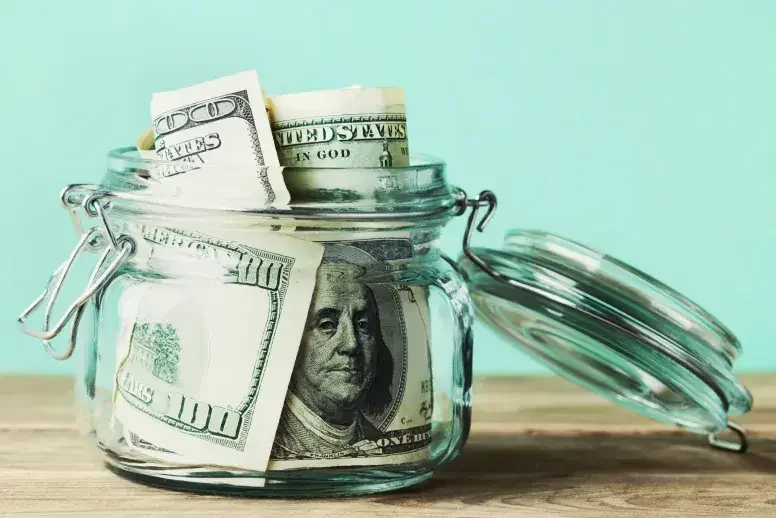It's normal to feel nervous when you hear about a possible recession or rising inflation—they're phenomena out of our control. And if you weren't raised with good money-saving and spending habits, they can catch you off-guard. That's why saving is so important.
When it comes to the best ways to save money, it's important to consider that if you lose a job or there is an emergency that comes up, you are not left without resources. You want to make sure that you can pay for the emergency and still have money left to pay for your daily living expenses.

But what's the best way to prepare for a recession and inflation? And what's the best way to get started with saving money, no matter your current income or age? Read these tips and start to implement them.
Review your spending habits
Before you can get control of your spending habits, it's important to understand where you're doing a lot of unnecessary spending and learn where your priorities are. Not every household has the same spending priorities. For example, a single, 30-year-old professional has different priorities than a family of five.
Tracking your spending is not about trying to shame you into more favorable habits but rather an opportunity to be honest with yourself about what you need vs. what habits can be shifted.
To start reviewing your spending habits, download all your bank account statements from the last three months. Some questions you can ask include:
- How much are you spending on household monthly bills like rent or mortgage, utility bills, daily transportation, etc.?
- How much do you spend on activities like eating out, traveling for fun, movie subscriptions, etc.?
- Have you saved any money during this time?
Write down some of your spending realizations in a money journal to help you understand where you are on your money journey.
Start a budget
Now that you have a handle on where your money is going, it's time to create a budget. It's important to note here that a budget is not meant to restrict your spending but rather to support you in creating a plan for where your money is going. Remember that not all budgets should look the same. However, there are some basic guidelines that may be helpful in getting your budget started.
What is the 50-30-20 rule?
One of the guidelines you can use to navigate your spending decisions is the 50-30-20 rule. This rule dictates that you allocate your money in the following manner:
- 50% goes toward needs
- 30% toward wants
- 20% toward savings
A need can be defined as an expense you cannot live without. This includes utility bills, rent or mortgage payments, health care expenses, and groceries. You can also choose to include payments on credit card debt or loans here.
A want is entertainment items like a streaming service where you can watch your favorite movies and TV series online. Perhaps you enjoy pizza and roller skating night with the family. Some may want to budget for self-care experiences like a spa treatment or date nights. Those leisure expenses can all be placed in the wants category.
The last 20% of your budget should be put toward planning for your future. This can be your emergency fund or a down payment on big-ticket items like a home or vehicle. You may also use these funds to pay down debt as well.
Pay down debt
No one wants to be straddled with debt during a recession. Why? Because your income and cost of living can fluctuate. No one expects to be laid off from their job or pay more for essential items like eggs. However, it happens all the time, and you need to be prepared. That's why paying off debt is an important step to include in your money plan.
If you want to cut costs and pay down debt fast, here are a few tips to help you get started.
- Pay more than the minimum on your credit cards and loans. Ask your bank or credit union if you can make an extra payment every month and put it toward the principal. Doing so will help you save on interest payments.
- Pay off the credit cards or loans with the highest interest rates. This will help you to pay less interest in the long run. Once that is paid off, move on to the next card or loan with the most interest.
- Pay your bills on time. It's possible to use technology to ensure that your bills are paid on time. Your bank may have tools to remind you of payment dates or even set up online bill payments right from your bank accounts.
It's also important to note here that managing your spending habits can be a great confidence booster when it comes to paying down your debt fast. You can utilize the 30-day rule (described below) to help you curb your spending altogether.
What is the 30-day rule?
The 30-day rule mandates that you wait 30 days before making an impulse buy. We often spend money frivolously on items we don't value. The 30-day rule gives you 30 days to wait and see if the purchase is worth separating yourself from your hard-earned money. Many times you'll find that the purchase that was so important to you 30 days earlier was just another impulse buy that can be left in the store.
Have an emergency fund
Do you have money set aside for everyday emergencies? The absolute worst time to think about saving is during an emergency. The event doesn't have to be catastrophic, but it may be an event that requires money that was not budgeted for. Perhaps your car was broken into, and you have to fix a shattered window. Maybe your child has a small dental emergency that requires immediate attention. Popular radio host and financial mentor Dave Ramsey tells his audience to have $1,000 in emergency cash available at all times.
How can I save $1,000 fast?
Depending on your spending habits, $1,000 may feel like a lot of money. However, you'd be surprised to see how easy saving $1,000 can be if you're focused.
- Sell items you're not using. Look around your house and start looking at items that have been sitting around, unused, for months or even years. Got some gently used clothing? Try selling it at a consignment store or Facebook Marketplace. Got some antique furniture or other knick knacks that are collecting dust? Try doing a garage sale.
- Get a part-time job. Take inventory of the skills you have that can be used immediately. Do you have specialized knowledge you can tutor children in? Can you wait tables on the weekend? This is just a temporary fix to help you save $1,000 fast.
- Take public transportation. Daily maintenance for a vehicle can get expensive. Think about the cost of gas, oil changes, road tolls, etc. Consider doing more walking, riding your bike, or paying for a monthly bus or train pass to help you get around town for less.
Use a high-yield savings account
Saving $1,000 is a great accomplishment toward helping you feel more secure during a recession or inflation. Be sure to check the annual percentage yield, or APY, on your bank's savings accounts. The national average APY for savings accounts is 0.25%. However, many online banks have savings rates higher than the national average. Try searching for a high-yield savings account at your local bank or credit union.
The most significant benefit of a high-yield savings account is that you earn a higher interest rate on deposits. This account also allows you to grow your money risk-free, making it an ideal place to hold your short-term savings like your $1,000 emergency fund.
But what do you have to consider if you want to know how to save money for bigger purchases? Consider creating a second high-yield savings account with a savings goal of $10,000. This can be used for more significant savings goals like a down payment on a house, a car, out-of-pocket medical expenses, etc.
How to save up $5,000 to $10,000 fast?
It's possible for you to save $5,000 to $10,000 in six months to a year if you make a decision to do so. Try utilizing a little discipline to ensure you reach your goal.
- Review your monthly budget. If you want to save as much as $10,000, you'll need to rethink where you spend your money. Do you really need three different streaming services? Are you eating out too much? Start moving around some items in your budget and reallocate them to your savings account.
- Shop around for cheaper services. Can you get a lower rate on your health or car insurance? Can you do your hair and nails at home? Can you get a cheaper cellphone data package? These are easy ways for you to save money.
- Be honest about what you need vs. what you want. We often make excuses to ourselves when we overspend. Sometimes we have to make adult decisions and prioritize what is important to us in order to meet our big-money goals.
Make meals at home
We all love the convenience of ordering food through an app, especially since life seems to be so busy. However, if you're serious about saving money during a recession, then you'll have to consider more practical ways to save money.
Some of the benefits of cooking at home include:
- Health. You get to control the ingredients you put in your food when it's prepared at home. It's easy to avoid fried foods or dishes prepared in unhealthy oils when you prepare them at home.
- Family. One of the things children remember is the time they spend at the dinner table with their family. It's a great time to catch up on what is important to each family member. Allow everyone to play a role in the meal preparation. The older kids can help you shop while the little ones can set the table.
- Time. Cooking at home doesn't have to be an all-day affair. It's possible to use meal prep techniques to help you save time in the kitchen. For example, batch-cook family meals like chili or soups that can easily be put in the freezer and warmed up when time is short.
Start a side hustle
Another great money-saving tip is to start a side hustle. A side hustle is an extra job or tasks you take on to help you earn more income. You don't need a lot of time to start a side hustle. This can be done during your free hours after your main job or during your weekend hours. Some quick side hustle ideas can include:
- Walking dogs or taking care of pets.
- Deliver food from restaurants or grocery stores.
- Drive for a ride-sharing service.
- Buy luxury items from the thrift store and resell them.
- Teach English online.
- Start a freelance writing or graphic design business.
- Become a virtual assistant.
- Bartend at the local club or eatery.
- Babysitting or child care.
- Rent out a spare room for travelers.
Side hustles are great for your long-term goals. Long-term goals are the big goals you have for the next 5 to 10 years. Let's say you want a more aggressive retirement account savings plan or put more money away for a house. It's possible to use your side hustle to set aside $100,000 in the next five to 10 years.
How to save $100,000 in five years?
Saving $100,000 in five years using your side hustle requires a change in mindset. You may have to upgrade your skills to prepare yourself for a better job. A side hustle can help you pay for an online course or a skill-based certificate from a college or trade school to be eligible for better-paying jobs.
Stick to your financial goals if you're serious about saving $100,000. Get clear on what you're willing to do to reach your goal. If you're willing to swear off vacations, then do so. If it means you don't have any new clothes or choose to spend more time doing free things in the neighborhood, then make a decision.
Take care of yourself during a recession and inflation
It's easy to make decisions out of fear when facing a recession and inflation. However, it's important to remember that the best way to face situations outside your control is to prepare. You can use these short and long-term money-saving strategies to ensure that you and your family are well taken care of.
FAQs: Money-saving tips for retention and inflation
How to save money during a recession?
Some quick tips to help you save during a recession include:
1) Pay down your debt fast. Be sure to pay more than the minimum balance so that you can pay off the principal faster.
2) Make meals at home. Turn it into an adventure by buying cookbooks that specialize in cuisines you love to eat at restaurants.
3) Cut unnecessary bills like subscription plans, apps, or activities you're not using.
4) Check the national average savings account APY against what you are using at your local bank. Move your savings to a bank with a higher APY if necessary.
5) Eliminate high-interest debt fast by paying off credit cards in order of highest interest to the lowest.
How to recession-proof your income
Find a way to make more money at your current job. This may look like negotiating for a raise. If a raise is not possible, try to negotiate a more comfortable working situation. Perhaps your employer will offer you Fridays off if you work an hour or two more during your other work days. This may give you more time with your family or other personal activities.
Is it necessary to hire a financial adviser?
A financial advisor can be helpful if you are interested in creating long-term strategies for wealth and minimizing risk. A qualified financial adviser can help you track, manage, and balance your investment portfolio.
How do I create emergency savings?
First, decide what you need an emergency savings fund for. Do you want to use it for car or home repairs, or unexpected medical bills? This can be as little as $500 to $1,000. This fund can be started by selling off items you are no longer using. This can be kitchen appliances in good condition, gently used clothing, furniture, etc. Use apps to help you with monthly budgeting and categorizing your spending so you can see where your money is going in real time.
How to stay cool during economic uncertainty?
It's normal to feel a bit of fear during tough times and economic uncertainty. However, it's best to put your mind on things you can control for your financial health and the health and well-being of your family. Focus on saving more money and building sources of side income. If you use the steps in this article, you'll start to see your cash reserves grow at a rapid rate.

